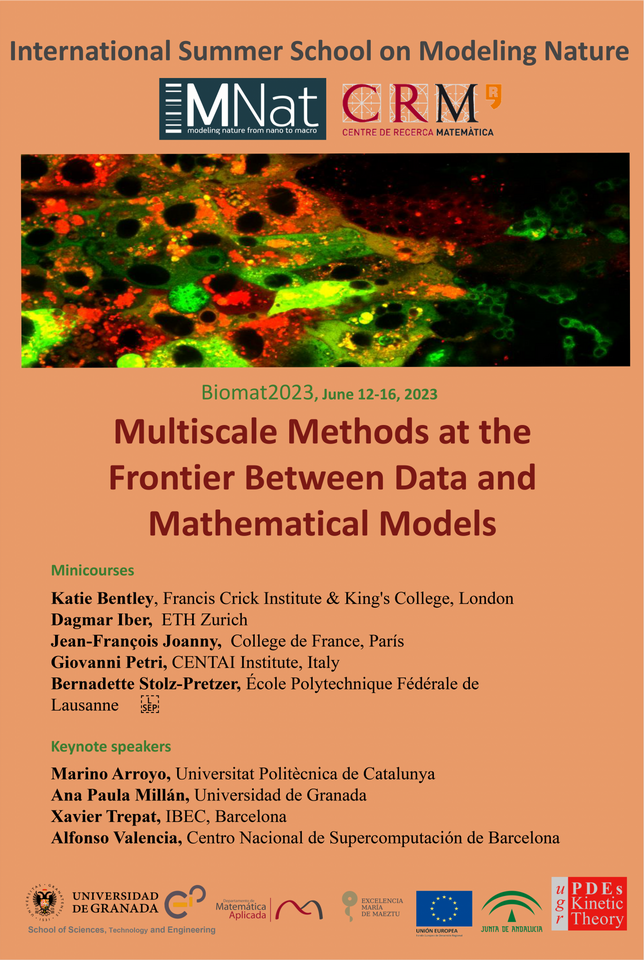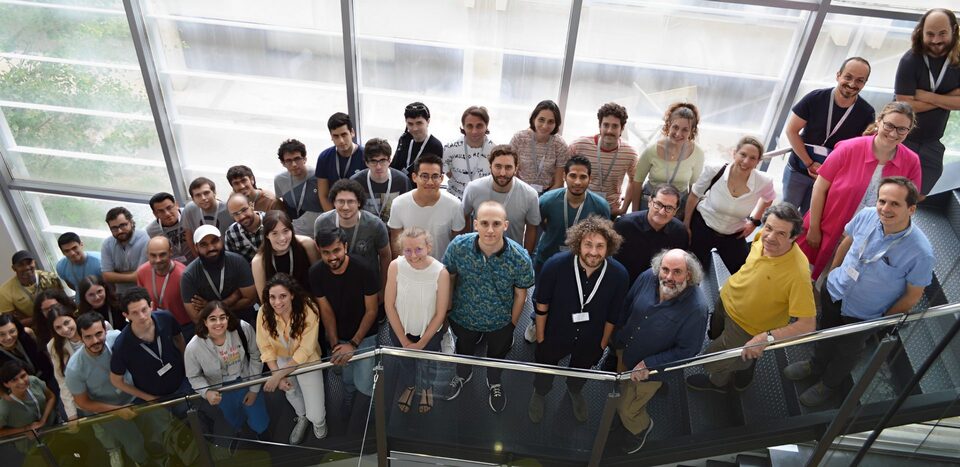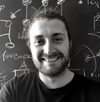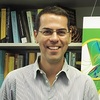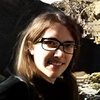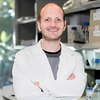Biomat 2023: Multiscale Methods at the Frontier Between Data and Mathematical Models
Sign into June 16, 2023
SCHEDULE
INTRODUCTION
The eighteenth edition of the Biomat International Summer School is based on the relationship between Biochemistry and Biomechanics, and their possible applications in neuroscience. The determination of the chemical interactions that govern the genesis, growth and renewal of different types of tissues is an emerging research problem in which advances have begun to be made with important implications. To some extent, it may be surprising to understand that the mechanical interactions that take place during the mentioned processes can also condition the functioning of a whole series of chemical reactions that take place in the tissue itself. The proper understanding of this type of relationship requires approaches that combine physical-mathematical foundations, analysis of experimental data, and computational simulation of models.
That is why the lines of teaching and research that this summer school addresses are found at the interface between Physics, Mathematics, Biology, Computer Science and the aforementioned Life Sciences and Social Sciences. The speakers have extensive experience in multidisciplinary research, which, from the point of view of training young scientists, will allow them to integrate various research sensibilities: mathematical modeling from micro to macro, complexity, data analysis, developmental biology , biomechanics, tumor dynamics, cell mechanics, social dynamics, numerical simulation, Deep learning… In turn, students will be able to make contact with the new frontiers of knowledge that are opening up as a result of the combination of the mentioned aspects, allowing them to acquire a privileged position to address cutting-edge lines of research with wide repercussions on society.
It is a fact that these types of topics are framed in an international context that is increasingly conducive to collaborations between scientists and specialists from different disciplines. For the reasons mentioned, this type of multidisciplinary school is growing.
CONTENTS
Courses
4 sessions, the first of which is devoted to a general introduction to the subject matter dealt within the course, and from there more specific/technical aspects are developed
Keynote talks
2-session talks by specialists of recognized prestige in their areas
Short half-hour talks
reserved for young speakers to present your work
COURSES
Mathematical modelling of self-organisation during embryonic development
Dagmar Iber
ETH Zurich
Dagmar Iber studied mathematics and biochemistry in Regensburg, Cambridge, and Oxford. She holds Master degrees and PhDs in both disciplines. After three years as a Junior Research Fellow in St John’s College, Oxford, Dagmar became a lecturer in Applied Mathematics at Imperial College London. Dagmar has joined ETH Zurich in 2008 after returning from an investment bank where she worked as an oil option trader for one year.
Website
ABSTRACT
Reproduction of complex life hinges on the reliable translation of the linear information that is contained in our DNA into complex 3D shapes and functions. In this course, I will present chemical and biophysical principles that enable this reliable self-organisation. While there is only a limited number of candidate mechanisms and at times it may be difficult to uncover any candidate mechanism, often more than one mechanism can, in principle, explain the same biological phenomenon. Careful data-based mathematical modelling is therefore important to distinguish between candidate mechanisms. In the last part, I will discuss approaches for data-based modelling and model selection.
Collective cell motility
Jean-François Joanny
College de France
After physics studies at Ecole Normale Supérieure de Paris (ENS ULM), Jean-François obtained his Thèse de 3e cycle in 1978 on polymer demixing and Thèse d’Etat in 1985 on wetting phenomena under the supervision of Pierre-Gilles de Gennes. Since January 2019, he is Professor at Collège de France, where he holds the chair of soft-matter and biophysics. Jean-François Joanny has received several distinctions: silver and bronze medals from the CNRS or the Ampère prize from the Académie des sciences. He was a junior and senior member of the Institut Universitaire de France (IUF).
Website
ABSTRACT
The course discusses some aspects of cell motility both at the individual cell level and at the collective level. The presentation is theoretical but the problems studied will be motivated by biological questions. One of the main aspects of the course is to treat the cell itself and at a larger cell an assembly of cells as active matter and to discuss cell motility within the framework of active matter theory.
1-Introduction to cell motility: The first lecture gives a general introduction to single cell motility in two and three dimensions. It discusses the large scale motion of cells as a persistent random walk and introduces briefly taxis phenomena. The final part discusses the general physical principles of cell motion on a solid substrate
2-Keratocyte motion: Keratocytes are one of the most studied models of cell motility. They have a very flat shape containing mostly the actin-myosin cytoskeleton that can be considered as an active gel. This second lecture presents very simple models of keratocyte motions emphasizing in particular the relative roles of actin turn-over and of acto-myosin contractility. It also discusses the shape of moving cells.
3-Spontaneous cell motion in cell monolayers: The third lecture considers collective cell motion in a confluent layer of elongated cells on a solid substrate. The cell layer is considered as an active nematic fluid. The lecture introduces the hydrodynamic theory of active nematics and shows how spontaneous flows can occur in the absence of imposed pressure gradients. If the activity is very large the layer reaches an active turbulent state.
4-Collective cell migration in an elastic matrix: During metastasis cancer cells migrate collectively through conjonctive tissues that can be considered as elastic media. Experiments in particular by P. Friedl have shown that there exist several types of migration patterns. The lectures presents a hydrodynamic theory of the cells migration in an elastic medium by considering them as an active polar fluid permeating through an elastic gel, and discusss the stability of a unifomly moving pattern. It also presents a more microscopic model where the cells remodel the matrix both by secreting and degrading it.
Bridging between higher-order mechanisms and higherorder phenomena
Giovanni Petri
CENTAI Institute
I am a Principal Researcher at CENTAI Institute working on topological approaches to complex networks and their underlying geometry, with special attention to the topology of brain structure and dynamics. Previously affiliation: ISI Foundation, Imperial College London.
-
-
-
PhD in Complex Networks, 2012Imperial College London
-
MSc in Theoretical Physics, 2008University of Pisa
-
BSc in Physics, 2005University of Pisa
-
-
Website
ABSTRACT
In this mini-course we will link together two sides of the recent progresses in higher-order systems.
On the one hand, we will describe recent advances in dynamical systems with interactions among groups of nodes (higher-order interactions) and the novel phenomenologies that stem from them.
On the other one, we will see how recent tools from algebraic topology and multivariate information theory characterise these behaviours in real-world data.
Finally, we will describe the current attempts to infer or reconstruct the original underlying higher-order models from data.
Topological Data Analysis for Oncology
Bernadette Stolz-Pretzer
École Polytechnique Fédérale de Lausanne
Website
ABSTRACT
Topological data analysis (TDA) is an emerging mathematical field that uses topological and geometric approaches to quantify the “shape” of data. Persistent Homology (PH), the most prominent method from TDA, captures topological invariants such as connected components, loops, and voids in data at multiple scales. The output from PH can be visualised in a barcode which can further be vectorised to enable integration with statistical and machine learning tools. In recent years, PH has been successfully applied to study many biological phenomena.
In this mini course I will introduce the mathematical concepts behind TDA and PH and show applications to both experimental data from oncology and the output from mathematical models. I will in particular demonstrate how PH allows us to quantify the effect of drugs on experimental data of vascular networks of tumours and how we can use similar approaches to stratify the parameter space of a mathematical model of tumour vasculature. I will then show how we can combine TDA and mathematical models to understand the effect of structural features of vascular networks on perfusion level and response to radiotherapy. Finally, I will present how PH can give insight into spatial relations in data and how it can complement machine learning approaches for biological data.
KEYNOTE SPEAKERS
Website
A mechano-biological feedback between cancer organoids and the ECM initiates and sustains collective invasion
Marino Arroyo
Universitat Politécnica de Catalunya
Website
The concurrence of structure and function in developing networks: An explanation for synaptic pruning
Ana Paula Millán
Universidad de Granada
ABSTRACT
A fundamental question in neuroscience is how structure and function of neural systems are related. We study this interplay by combining a familiar auto-associative neural network with an evolving mechanism for the birth and death of synapses. A feedback loop then arises leading to two qualitatively different behaviours. In one, the network structure becomes heterogeneous and dissasortative and the system displays good memory performance. In the other, the structure remains homogeneous and incapable of pattern retrieval. These findings are compatible with experimental results on early brain development, and provide an explanation for the existence of synaptic pruning. Other evolving networks, such as those of protein interaction, might share the basic ingredients for this feedback loop, and indeed many of their structural features are as predicted by our model.
Website
Epithelial mechanobiology from the bottom up
Xavier Trepat
Institute for Bioengineering of Catalonia
ABSTRACT
Epithelial sheets form specialized 3D structures suited to their physiological roles, such as branched alveoli in the lungs, tubes in the kidney, and villi in the intestine. To generate and maintain these structures, epithelia must undergo complex 3D deformations across length and time scales. How epithelial shape arises from active stresses, viscoelasticity and luminal pressure remains poorly understood. I will present different approaches to study the mechanobiology of epithelial shape from the bottom up. I will discuss new technologies to design epithelia of arbitrary size and geometry and to subject them to controlled mechanical deformations in 3D. I will show that monolayers exhibit superelastic behavior when stretch is applied and that they readily buckle when tension is released. We use this phenomenology and a 3D vertex model to rationally direct spontaneous pattern formation, and hence engineer tissue folding. I will also present our recent advances to understand the mechanobiology of intestinal organoids. We show that these organoids exhibit a non-monotonic stress distribution that defines mechanical and functional compartments. From these experiments we conclude that the stem cell compartment folds through apical constriction and that cells are pulled out of the crypt along a gradient of increasing tension, rather than pushed by a compressive stress downstream of mitotic pressure as previously assumed. This experimental and theoretical work unveils how patterned forces enable folding and collective migration in the intestinal crypt.
Website
TBA
Alfonso Valencia
Centro Nacional de Supercomputación de Barcelona
Alfonso Valencia is the director of the Spanish National Bioinformatics Institute (INB-ISCIII). The INB represents the Spanish node of the European Bioinformatics infrastructure ELIXIR, and is committed to generating and supplying bioinformatics solutions in the context of national and international activities and consortia. His research group is dedicated to the application of machine learning and artificial intelligence to Personalized Medicine, and exhibits ample experience in the development of software platforms for the extraction, integration and representation of big data for large-scale genome projects.
Organizing and Scientific Committee
Tomás Alarcon | ICREA-CRM
Juan Calvo | Universidad de Granada
David Poyato | Universidad de Granada
Juan Soler | Universidad de Granada
Contributions
-
- Contributions deadline: May 2nd, 2023
- Decisions will be communicated by May 9th, 2023
grants
- Application deadline for grants: May 2nd, 2023
- Grantees will be notified by May 9th, 2023
REGISTRATION
To register for this event, please click on the Sign in button located at the top of this page. You will be asked to create a CRM web user account (if you already have an account, please log in) before registering to the activity through the following link:
CRM USER CREATION
Please note that it will be necessary to fill in both the personal and academic requested information in the web user intranet. Once your web user is created, you may register for the activity through the following link.
REGISTER
list of participants
| Name | Institution |
|---|---|
| Silvia Bordel Vozmediano | Universidad de Castilla-La Mancha |
| Lucía Benito Barca | Universidad de Castilla-La Mancha |
| Sébastien Tran Tien | Université Lyon 1 |
| Dagmar Iber | Francis Crick Institute & King’s College, London |
| Jean-François Joanny | College de France, París |
| Giovanni Petri | CENTAI Institute |
| Bernadette Stolz-Pretzer | École Polytechnique Fédérale de Lausanne |
| Xavier Trepat | Institut de Bioenginyeria de Catalunya (IBEC) |
| Alfonso Valencia | Barcelona Supercomputing Center (BSC) |
| Júlia Folguera Profitós | Universitat Autònoma de Barcelona |
| Marino Arroyo | Universitat Politècnica de Catalunya |
| Ahmad Khan | Universitat Politècnica de Catalunya |
| Adam Ouzeri | Universitat Politècnica de Catalunya |
| Marta Casanellas Rius | Universitat Politècnica de Catalunya |
| Jose Muñoz | Universitat Politècnica de Catalunya |
| Juan Campos | Universidad de Granada |
| LAZARO RENE IZQUIERDO FABREGAS | Universidad de Granada |
| Juan Soler | Universidad de Granada |
| Elena Torres Lozano | Universidad de Granada |
| Alexis Béjar López | Universidad de Granada |
| Carlos Borja Pulido Garcia | Universidad de Granada |
| Jesús David Poyato Sánchez | Universidad de Granada |
| Juan Calvo Yagüe | Universidad de Granada |
| Oscar Sanchez | Universidad de Granada |
| Simon Bonnal | Universidad de Granada |
| Felipe Guerrero Barba | Universidad de Granada |
| Angel Franco Rodriguez | Universidad de Granada |
| Blanca A. López Ríos | Universidad de Granada |
| Juan Manuel Montes López | Universidad de Granada |
| Cristóbal Vázquez García | Universidad de Granada |
| Julián Cabrera Linares | Universidad de Granada |
| Beatriz Blanco Besteiro | Universidad de Granada |
| Daniel Téllez Calle | Universidad de Granada |
| Ana Paula Millan | Universidad de Granada |
| Benjamin Tirado Heras | Universidad de Granada |
| Allan García | Universidad de Castilla La Mancha |
| Pilar Guerrero | Universidad Carlos III de Madrid |
| Charlotte Dugourd | Claude Bernard University Lyon 1 |
| Manish Gupta | Dresden University of Technology |
| Josep Sardanyés | Centre de Recerca Matemàtica |
| Isaac Salazar-Ciudad | Centre de Recerca Matemàtica |
| Juan Arellano Tintó | Centre de Recerca Matemàtica |
| Alvaro Corral | Centre de Recerca Matemàtica |
| Roser Homs Pons | Centre de Recerca Matemàtica |
| Kevin Martínez Añón | Centre de Recerca Matemàtica |
| Angélica Torres | Centre de Recerca Matemàtica |
| Giovanni Dalmasso | Centre de Recerca Matemàtica |
| Tomas Alarcon | Centre de Recerca Matemàtica |
INVOICE/PAYMENT INFORMATION
IF YOUR INSTITUTION COVERS YOUR REGISTRATION FEE: Please note that, in case your institution is paying for the registration via bank transfer, you will have to indicate your institution details and choose “Transfer” as the payment method at the end of the process.
UPF | UB | UPC | UAB
*If the paying institution is the UPF / UB/ UPC / UAB, after registering, please send an email to comptabilitat@crm.cat with your name and the institution internal reference number that we will need to issue the electronic invoice. Please, send us the Project code covering the registration if needed.
Paying by credit card
IF YOU PAY VIA CREDIT CARD but you need to provide the invoice to your institution to be reimbursed, please note that we will also need you to send an email to comptabilitat@crm.cat providing the internal reference number given by your institution and the code of the Project covering the registration (if necessary).
lodging information
ON-CAMPUS AND BELLATERRA
BARCELONA AND OFF-CAMPUS
acknowledgements
|
For inquiries about this event please contact the Scientific Events Coordinator Ms. Núria Hernández at nhernandez@crm.cat
|


